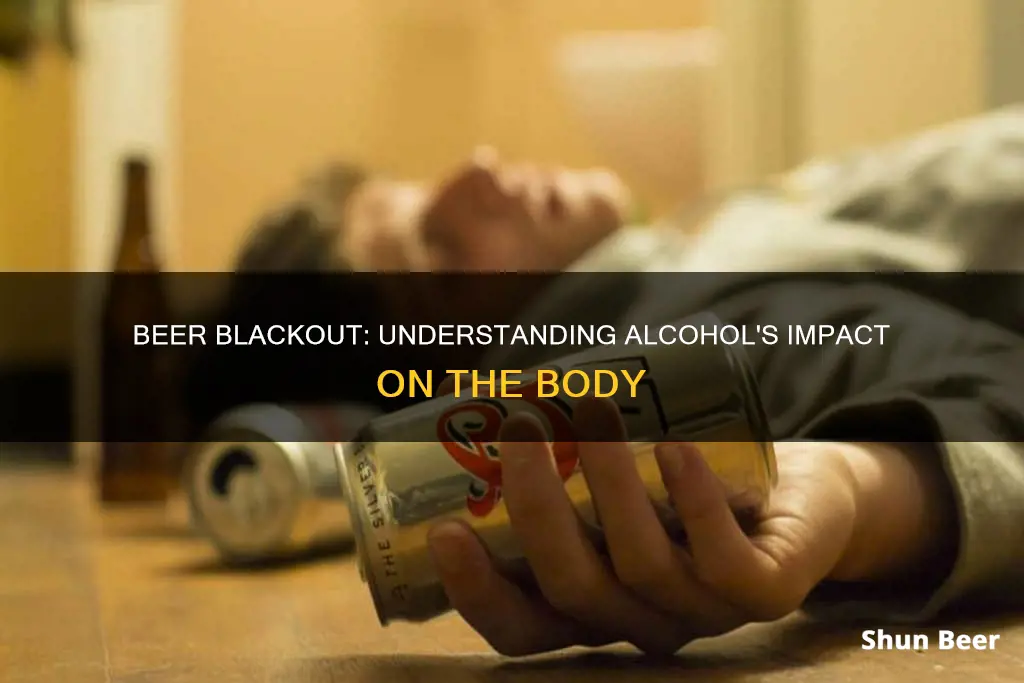
Alcohol-induced blackouts, or temporary memory losses, can occur in people of any age or drinking experience. Blackouts are caused by a rapid increase in blood alcohol concentration (BAC) levels, resulting in a temporary loss of memory. While blacking out, a person can still walk, talk, and engage in complex behaviours, but they won't be able to form new memories. This can lead to dangerous situations, such as driving, having unsafe sex, or performing other risky behaviours. Blackouts are often linked to binge drinking and can have both short-term and long-term effects on the brain, including memory problems and impaired cognitive function. It's important to drink in moderation and monitor alcohol consumption to avoid blackouts and their potential consequences.
| Characteristics | Values |
|---|---|
| Definition | A temporary condition that affects your memory, characterised by a sense of lost time |
| Cause | A rapid increase in blood alcohol concentration (BAC) levels |
| Memory loss type | Partial or complete |
| Passing out vs blacking out | Different |
| Risk factors | Binge drinking, drinking on an empty stomach, medication, gender, age, body composition, weight, height |
| Effects | Impaired memory, risky behaviour, injuries, accidents, legal problems, flashbacks, relationship problems, job loss, liver damage, brain damage |
| Prevention | Drinking in moderation, drinking slowly, eating before drinking, drinking water, avoiding drinking games |
What You'll Learn

What is a blackout?
A blackout is a temporary condition that affects your memory. It is characterised by a sense of lost time.
Blackouts are a period of alcohol-induced amnesia, during which a person can actively engage in behaviours such as walking or talking, but won't be able to remember doing so. This is extremely dangerous, as the person may attempt to drive, have unsafe or non-consensual sex, or perform other risky behaviours that can lead to harmful and potentially life-threatening situations.
Blackouts occur when body alcohol levels are high. Alcohol impairs the ability to form new memories while intoxicated. It doesn't erase memories formed before intoxication. As you drink more alcohol, the rate and length of memory loss will increase.
There are two types of blackouts: partial and complete. A partial blackout may be triggered by visual or verbal cues, helping the person to remember forgotten events. A complete blackout results in permanent memory loss. Even with cues, it is unlikely the person will remember what happened during this time.
Blackouts are often associated with alcohol consumption. Drinking too much alcohol too quickly, or on an empty stomach, can cause a blackout. However, blackouts can also be caused by psychogenic seizures or a fall in blood pressure.
During a blackout, a person is still functioning normally. They may seem articulate and can still eat, walk, hold conversations, and drive. They just can't record any memories. This seemingly aware state can make it difficult for others to recognise that a person is experiencing a blackout.
How to Avoid Blackouts
- Drink in moderation
- Avoid binge drinking
- Eat a meal or heavy appetizers before and during alcohol consumption
- Drink slowly
- Drink a glass of water between alcoholic drinks
- Avoid drinking games
- Don't drink on an empty stomach
- Avoid mixing alcohol with other substances
- Have a safe way to get home
Beer and Methylprednisolone: Safe Mix?
You may want to see also

What causes a blackout?
A blackout is a temporary condition that affects your memory. It is not the same as passing out, where a person falls asleep or becomes unconscious due to excessive alcohol consumption. Instead, a blackout is characterised by a sense of lost time, where an intoxicated person actively engages in behaviours like walking or talking but has no memory of doing so.
Blackouts are caused by a rapid increase in blood alcohol concentration (BAC) levels, which results in a temporary loss of memory. A person normally experiences a blackout when their BAC reaches around 0.14% to 0.22%, which is almost twice the legal limit for driving.
There are two types of blackouts: partial and complete. A partial blackout is a fragmentary or greyout, where only pieces of memory are lost, and visual or verbal cues may help the person remember forgotten events. A complete blackout involves total memory loss, and even with cues, the person is unlikely to recall what happened.
Blackouts are often associated with drinking too much alcohol too quickly or on an empty stomach. However, they can also be caused by psychogenic seizures or a fall in blood pressure (syncope).
During a blackout, a person is still conscious and functioning as normal. They may seem articulate and can still eat, walk, hold conversations, have sex, drive, and get into fights. They just can't record any of the memories. This seemingly aware state can make it difficult for others to recognise that a person is in a blackout.
Heavy drinking may have lasting effects on the brain, ranging from momentary "slips" in memory to permanent, debilitating conditions. It is thought that chronic alcohol consumption can harm the frontal lobe, which controls cognitive function, short-term and long-term memory formation, and recall. Regular damage to the frontal lobe can impair behaviour and personality, the ability to perform tasks, and memory retention.
Binge drinking, defined as consuming five or more drinks in about two hours for men or four or more drinks for women, can increase the risk of blackouts. Other factors that can affect blood alcohol level and contribute to blackouts include the type of alcohol consumed, how quickly it is consumed, body weight, body fat percentage, and key enzyme levels.
Blackouts can be dangerous and lead to harmful or life-threatening situations. For example, a person in a blackout state may attempt to drive, have unsafe or non-consensual sex, or engage in other risky behaviours. Additionally, a person who has blacked out could throw up while sleeping due to the loss of reflex control and potentially choke or suffocate on their vomit.
To prevent blackouts, it is important to drink in moderation and pace yourself. Avoid binge drinking, eat before and during alcohol consumption, and drink slowly by sipping rather than gulping.
Beer and Low-Sodium Diets: What You Need to Know
You may want to see also

How is a blackout different from passing out?
Drinking beer or any other form of alcohol can lead to blackouts and passing out. While both are caused by excessive alcohol consumption, they are distinct from each other.
A blackout is a temporary condition that affects your memory. It is characterised by a sense of lost time. During a blackout, the intoxicated person is still conscious and functioning normally. They can walk, talk, eat, drive, and have sex, but they cannot form new memories. The hippocampus, which is responsible for forming long-term memories, is affected by high levels of alcohol. This results in a blackout, where the person loses the ability to form new memories for a few hours to several days.
On the other hand, passing out refers to falling asleep or losing consciousness due to excessive alcohol consumption. The person is no longer awake and functioning normally. They cannot be awakened and may even slip into a coma and die.
While a person is experiencing a blackout, they may seem articulate and aware, making it difficult for others to recognise their condition. However, during this time, they are susceptible to injuries and engaging in risky behaviours without remembering them later.
It is important to note that blackouts and passing out are not the same as "brownouts" or "greyouts," which refer to milder alcohol-induced memory impairments.
German Beer and Gluten Sensitivity: What's the Verdict?
You may want to see also

What are the risks of blacking out?
Blackouts, or temporary memory losses, can result from drinking beer or any other type of alcohol. They are a dangerous state to be in, as the drinker is susceptible to many risks and negative consequences. Here are some of the risks associated with blackouts:
Risk of Injury
During a blackout, a person is susceptible to physical injuries from falls, car crashes, or other accidents. The drinker may attempt to perform tasks that require coordination, such as driving, which can lead to harmful and potentially life-threatening situations.
Impaired Decision-Making
The high level of intoxication during a blackout impairs decision-making and other psychological processes. This can lead to risky behaviours, such as unprotected sexual intercourse, vandalism, or other activities that could have serious health, legal, or financial consequences.
Alcohol Poisoning
Excessive alcohol consumption can lead to alcohol poisoning, which is a medical emergency. Ingesting large amounts of alcohol can cause severe impairment, including vomiting, blackouts, and a loss of consciousness.
Negative Health Consequences
Chronic alcohol consumption to the point of blacking out can have long-term negative consequences on the brain, including the frontal lobe, which is responsible for cognitive function and memory formation. Regular damage to this area can impair behaviour, personality, and the ability to perform tasks and retain memories.
Choking Hazard
According to the National Institute on Alcohol Abuse and Alcoholism, alcohol delays signals in the brain that control the gag reflex. A person who has blacked out may throw up while sleeping and potentially choke or suffocate on their vomit.
Emotional and Psychological Consequences
Blackouts can result in feelings of depression or anxiety regarding alcohol use and lost memories. If excessive drinking continues, these symptoms may develop into chronic mental health conditions.
Copper Mugs and Beer: Safe or Not?
You may want to see also

How can you avoid blacking out?
Blackouts are a temporary condition that affects your memory. They occur when your body's alcohol levels are high, impairing your ability to form new memories. To avoid blacking out, it is important to understand the factors that influence your blood alcohol level and take steps to moderate your alcohol consumption. Here are some strategies to help you avoid blackouts:
- Eat before and during drinking: Having a meal or heavy appetizers before and while consuming alcohol can help slow down the absorption of alcohol and reduce the risk of blacking out.
- Drink slowly: Take your time and sip your drink slowly. Avoid gulping or drinking too quickly. This gives your body more time to process the alcohol and can help you keep track of how alcohol is affecting you.
- Space out your drinks: Consider drinking a glass of water or a non-alcoholic beverage between alcoholic drinks. This will help you stay hydrated, slow down your consumption, and reduce the overall amount of alcohol you consume.
- Avoid drinking on an empty stomach: Drinking on an empty stomach can cause your blood alcohol level to rise rapidly, increasing the risk of a blackout. Eat a meal or a heavy snack before drinking to help slow the absorption of alcohol.
- Choose lower-alcohol drinks: Opt for drinks with a lower alcohol content, such as beer or cider, instead of hard liquors. The higher the alcohol content, the more likely you are to experience a blackout.
- Avoid mixing alcohol with other substances: Mixing alcohol with medications, drugs, or other recreational substances can increase the risk of blackouts and other dangerous side effects. Read medication labels carefully and consult your doctor or pharmacist if you have any questions.
- Stay hydrated: Drinking water regularly throughout the night can help dilute the alcohol in your system and slow its absorption.
- Know your limits: Understand the signs of intoxication and be mindful of your drinking pace. Limit yourself to no more than 1-2 drinks per day, depending on your gender. Binge drinking, which is consuming a large amount of alcohol in a short period, increases the risk of blackouts.
- Have a designated non-drinker: If you are prone to blackouts, consider having a friend who stays sober and helps you pace yourself. They can also look out for any signs of intoxication and ensure you get home safely.
- Be mindful of your family history: If you have a family history of alcoholism, you may be at a higher risk for blackouts. Consider abstaining from alcohol or drinking in moderation to reduce the risk.
- Seek medical help if needed: If you have concerns about your drinking habits or experience frequent blackouts, talk to your doctor. They can help you determine if you have a drinking problem and provide guidance or treatment options.
Ginger Beer: Kid-Friendly Beverage or Not?
You may want to see also
Frequently asked questions
A blackout is a period of alcohol-induced amnesia, where a person is conscious and active but is unable to form new memories. This is often confused with "passing out", which is a loss of consciousness.
Blackouts are caused by a rapid increase in blood alcohol concentration (BAC) levels, which impairs the brain's ability to form new memories. The hippocampus, responsible for memory formation, is affected by high levels of alcohol.
It can be challenging to identify if someone is blacked out as they may seem awake and alert. However, signs may include slurred speech, stumbling, loss of balance, and vomiting. They may also repeat sentences, be easily distracted, and show a lack of concern for others' thoughts and feelings.
Blacking out can lead to dangerous and risky behaviours, such as driving, unprotected sex, or other activities that could result in accidents, injuries, or legal consequences. It can also cause feelings of anxiety and depression regarding alcohol use and lost memories.
To prevent blackouts, it is important to drink in moderation, avoid binge drinking, and refrain from drinking on an empty stomach. Drinking slowly and alternating alcoholic drinks with water can also help.







